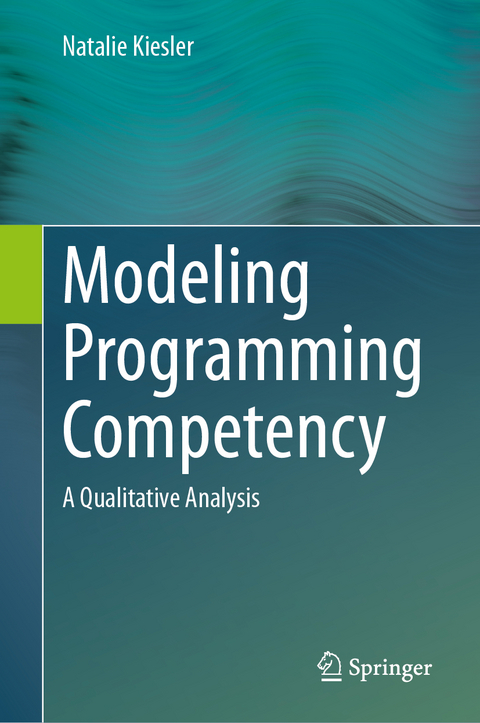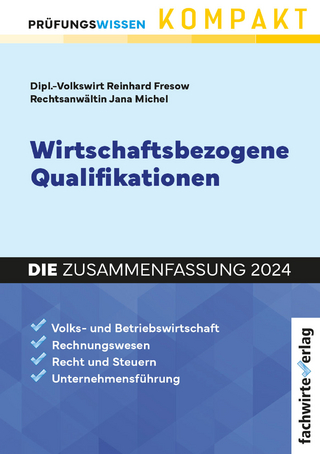
Modeling Programming Competency
Springer International Publishing (Verlag)
978-3-031-47147-6 (ISBN)
Although programming is a core tier of computing and many related disciplines, learning how to program can be challenging in higher education, and many students fail in introductory programming. The book aims to understand what programming means, what programming competency encompasses, and what teachers expect of novice learners. In addition, it illustrates the cognitive complexity of programming as an advanced competency, including knowledge, skills, and dispositions in context. So, the purpose is to communicate the breadth and depth of programming competency to educators and learners of programming, including institutions, curriculum designers, and accreditation bodies. Moreover, the book's goal is to represent how a qualitative research methodology can be applied in the context of computing education research, as the qualitative research paradigm is still an exception in computing education research.
The book provides new insights into programming competency. It outlines the components of programming competencies in terms of knowledge, skills, and dispositions and their cognitive complexity according to the CC2020 computing curricula and the Anderson-Krathwohl taxonomy of the cognitive domain. These insights are essential as programming constitutes one of the most relevant competencies in all computing study programs. In addition, being able to program describes the capability of solving problems, which is also a core competency in today's increasingly digitalized society. In particular, the book reveals the great relevance of dispositions and other competency components in programming education, which curricula currently fail to recognize and specify. In addition, the book outlines the resulting implications for higher education institutions, educators, and student expectations. Yet another result of interest to graduate students is the multi-method study design that allows for the triangulation of data and results.
Dr. Natalie Kiesler is currently a senior researcher at the Educational Computer Science group at the DIPF Leibniz Institute for Research and Information in Education, and a lecturer at the Computer Science department at Goethe University Frankfurt, Germany. Her research focuses on competency, educational technologies, and feedback in the context of computing education. She has received several awards for her work, including the Best Demo Award at the Educational Technologies Conference (DELFI), and the Hessian University Award for Excellence in University Teaching. She is also involved in various committees and reviews for several conferences and journals within the computing education research and education technology community. She also initiated and led a working group of the German Informatics Society to promote and investigate Open Data Practices in Educational Technology Research.
1 Introduction.- 1.1 Background and Motivation.- 1.2 Goal and Research Questions.- 1.3 Contextualization of this Research.- 1.4 Structure of the Book.- References.- 2 Approaching the Concept of Competency.- 2.1 Competency Definition.- 2.1.1 Psychological Perspective on Competency.- 2.1.2 Historical Perspective on Competency.- 2.1.3 Recent Perspectives and Discussions.- 22 2.2 Taxonomies and Competency Models for Computing.- 2.2.1 Bloom's and Anderson-Krathwohl's Taxonomy.- 2.2.2 Competency Model of the German Informatics Society.- 2.3 Competency-Based Curricula Recommendations in Computing.- 2.3.1 Information Technology 2017.- 2.3.2 Computing Curricula 2020.- 2.3.3 National Curricula .- Recommendations.- 2.4 Related Research in Computing Education.- References.- 3 Research Design.- 3.1 Summary of Research Desiderata.- 3.2 Research Goals.- 3.3 Research Questions.- 3.4 Study Design.- References.- Part II Data Gathering and Analysis of University Curricula.- 4 Data Gathering of UniversityCurricula.- 4.1 Goals of Gathering and Analyzing University Curricula.- 4.2 Relevance of Gathering and Analyzing University Curricula.- 4.3 Expectations and Limitations.- 4.4 Sampling and Data Gathering.- 4.4.1 Selection of Bachelor Degree Programs.- 4.4.2 Selection of Content Area.- 4.4.3 Selection of Institutions and Study Programs.- 4.4.4 Selection of Modules.- References.- 5 Data Analysis of University Curricula.- 5.1 Methodology of the Data Analysis.- 5.2 Pre-processing of Data.- 5.2.1 Linguistic Smoothing of Competency Goals.- 5.2.2 Basic Coding Guidelines.- 5.2.3 Computer-Assisted Analysis.- 5.3 Data Analysis.- 5.3.1 Deductive Category Development.- 5.3.2 Inductive Category Development.- 5.3.3 Deductive-Inductive Category Development.- 5.4 Application of Quality Criteria.- References.- Part III Data Gathering and Analysis of Expert Interviews.- Data Gathering of Guided Expert Interviews.- 6.1 Goals of Conducting and Analyzing Guided Expert Interviews.- 6.2 Relevance of Conducting and Analyzing Guided Expert Interviews.- 6.3 Expectations and Limitations.- 6.4 Developing an Interview Guide and Questions.- 6.5 Data Gathering and Sampling.- 6.5.1 Selecting and Contacting Experts.- 6.5.2 Conducting the Interviews.- 6.5.3 Recording the Interviews.- References.- 7 Data Analysis of Guided Expert Interviews.- 7.1 Pre-processing of Data.- 7.1.1 Transcription Guidelines.- 7.1.2 Transcription System.- 7.1.3 Transcription Process.- 7.2 Data Analysis.- 7.3 Application of Quality Criteria References.- Part IV Results 8 Results of University Curricula Analysis.- 8.1 Cognitive Competencies.- 8.1.1 Cognitive Process Dimension Remembering.- 8.1.2 Cognitive Process Dimension Understanding.- 8.1.3 Cognitive Process Dimension Applying.- 8.1.4 Cognitive Process Dimension Analyzing.- 8.1.5 Cognitive Process Dimension Evaluating.- 8.1.6 Cognitive Process Dimension Creating.- 8.1.7 Knowledge Dimensions.- 8.2 Other Competencies.- 8.3 Reliability.- 8.4 Discussion of Results.- References.- 9 Results of Guided Expert Interviews.- 9.1 Cognitive Competencies.- 9.2 Other Competencies.- 9.3 Factors Preventing Programming Competency.- 9.4 Factors Contributing to Programming Competency.- 9.5 Reliability.- 9.6 Discussion of Results.- References.- 10 Summarizing and Reviewing the Components of Programming Competency.- 10.1 Summary of Cognitive Programming Competencies.- 10.2 Summary of Other Programming Competency Components.- 10.3 Review of the Anderson Krathwohl Taxonomy.- References.- Part V Wrap Up.- 11 Conclusion.- 11.1 Brief Summary of Results.- 11.1.1 Competencies Expected from Novice Programmers.- 11.1.2 Adequacy of the Anderson Krathwohl Taxonomy.- 11.1.3 Factors Influencing Students' Competency Development.- 11.2 Conclusions.- 11.3 Future Work. References.- 12 Complete List of References.
| Erscheinungsdatum | 04.01.2024 |
|---|---|
| Zusatzinfo | XVII, 165 p. 4 illus. |
| Verlagsort | Cham |
| Sprache | englisch |
| Maße | 155 x 235 mm |
| Gewicht | 439 g |
| Themenwelt | Schulbuch / Wörterbuch ► Unterrichtsvorbereitung ► Unterrichts-Handreichungen |
| Mathematik / Informatik ► Informatik | |
| Schlagworte | Basic programming education • Competency • Competency-based education • Competency Modeling • Computer Science • computing education • Curricula Analysis • Curricula Design • dispositions • Guided Interviews • Introductory Programming • learning objectives • Learning Programming • novice programmer • Programming Competency • programming education • qualitative content analysis • university curricula |
| ISBN-10 | 3-031-47147-4 / 3031471474 |
| ISBN-13 | 978-3-031-47147-6 / 9783031471476 |
| Zustand | Neuware |
| Haben Sie eine Frage zum Produkt? |
aus dem Bereich


